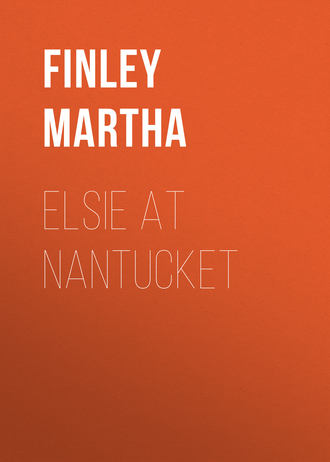 полная версия
полная версияElsie at Nantucket
"Oh, I'm so glad he didn't!" Grace said, drawing a long breath. "Do they eat sharks, Maxie?"
"No, indeed; who'd want to eat a fish that maybe had grown fat on human flesh?"
"What do they kill them for, then?"
"Oh, to rid the seas of them, I suppose, and because there is a valuable oil in their livers. We saw our fellows towed ashore and cut open and their livers taken out."
CHAPTER IV
"There is none other name under heaven given among men whereby we must be saved." —Acts 4: 12.
It was down on the beach Max had been telling his story; the evening was beautiful, warm enough to make the breeze from the sea extremely enjoyable, and the whole family party were gathered there, some sitting upon the benches or camp-chairs, others on rugs and shawls spread upon the sand.
Max seemed to have finished what he had to say about the day's exploits, and Gracie rose and went to her father's side.
He drew her to his knee with a slight caress. "What has my little girl been doing all day?"
"Playing in the sand most of the time, papa. I'm so glad those horrid sharks didn't get a chance to bite you or anybody to-day. Such big, dreadful-looking creatures Maxie says they were."
"Not half so large as some I have seen in other parts of the world."
"Oh, papa, will you tell us about them? Shall I call Max and Lulu to hear it?"
"Yes; if they wish to come, they may."
There was scarcely anything the children liked better than to hear the captain tell of his experiences at sea, and in another moment his own three. Rosie, Walter, and several of the older people were gathered around him, expecting quite a treat.
"Quite an audience," he remarked, "and I'm afraid I shall disappoint you all, for I have no yarn to spin, only a few items of information to give in regard to other varieties of sharks than are to be found on this coast.
"The white shark, found in the Mediterranean and the seas of many of the warmer parts of the world, is the largest and the most feared of any of the monsters of the deep. One has been caught which was thirty-seven feet long. It has a hard skin, is grayish-brown above and whitish on the under side. It has a large head and a big wide mouth armed with a terrible apparatus of teeth – six rows in the upper jaw, and four in the lower."
"Did you ever see one, papa?" asked Grace, shuddering.
"Yes, many a one. They will often follow a ship to feed on any animal matter that may be thrown or fall overboard, and have not unfrequently followed mine, to the no small disturbance of the sailors, who have a superstitious belief that it augurs a death on board during the voyage."
"Do you believe it, captain?" queried little Walter.
"No, my boy, certainly not; how should a fish know what is about to happen? Do you think God would give them a knowledge of the future which He conceals from men? No, it is a very foolish idea which only an ignorant, superstitious person could for a moment entertain. Sharks follow the ships simply because of what is occasionally thrown into the water. They are voracious creatures, and sometimes swallow articles which even their stomachs cannot digest. A lady's work-box was found in one, and the papers of a slave-ship in another."
"Why, how could he get them?" asked Walter.
"They had been thrown overboard," said the captain.
"Do those big sharks bite people?" pursued the child.
"Yes, indeed; they will not only bite off an arm or leg when an opportunity offers, but have been known to swallow a man whole."
"A worse fate than that of the prophet Jonah," remarked Betty. "Do the sailors ever attempt to catch them, captain?"
"Sometimes; using a piece of meat as bait, putting it on a very large hook attached to a chain; for a shark's teeth find no difficulty in going through a rope. But when they have hooked him and hauled him on board they have need to be very careful to keep out of reach of both his teeth and his tail; they usually rid themselves of danger from the latter by a sailor springing forward and cutting it above the fin with a hatchet.
"In the South Sea Islands they have a curious way of catching sharks by setting a log of wood afloat with a rope attached, a noose at the end of it; the sharks gather round the log, apparently out of curiosity, and one or another is apt soon to get his head into the noose, and is finally wearied out by the log."
"I think that's a good plan," said Grace, "because it doesn't put anybody in danger of being bitten."
No one spoke again for a moment, then the silence was broken by the sweet voice of Mrs. Elsie Travilla: "To-morrow is Sunday; does any one know whether any service will be held here?"
"Yes," replied Mr. Dinsmore; "there will be preaching in the parlors of one of the hotels, and I move that we attend in a body."
The motion was seconded and carried, and when the time came nearly every one went. The service occupied an hour; after that almost everybody sought the beach; but though some went into the surf – doubtless looking upon it as a hygienic measure, therefore lawful even on the Lord's day – there was not the usual boisterous fun and frolic.
Harold, by some manoeuvring, got his mother to himself for a time, making a comfortable seat for her in the sand, and shading her from the sun with an umbrella.
"Mamma," he said, "I want a good talk with you; there are some questions, quite suitable for Sunday, that I want to ask. And see," holding them up to view, "I have brought my Bible and a small concordance with me, for I know you always refer to the Law and to the Testimony in deciding matters of faith and practice."
"Yes," she said, "God's Word is the only infallible rule of faith and practice. All scripture is given by inspiration of God, and is profitable for doctrine, for reproof, for correction, for instruction in righteousness!"
"Yes, mamma, I have the reference here; Second Timothy, third chapter, and sixteenth verse. And should not the next verse, 'That the man of God may be perfect, thoroughly furnished unto all good works,' stir us up to much careful study of the Bible?"
"Certainly, my dear boy; and, oh what cause for gratitude that we have an infallible instructor and guide! But what did you want to ask me?"
"A question that was put to me by one of our fellows at college, and which I was not prepared to answer. The substance of it was this: 'If one who has lived for years in the service of God should be suddenly cut off while committing some sin, would he not be saved, because of his former good works?'"
"Is any son or daughter of Adam saved by good works?" she asked, with a look and tone of surprise.
"No, mother, certainly not; how strange that I did not think of answering him with that query. But he maintained that God was too just to overlook – make no account of – years of holy living because of perhaps a momentary fall into sin."
"We have nothing to hope from God's justice," she replied, "for it wholly condemns us. 'There is none righteous, no, not one… Therefore by the deeds of the law there shall no flesh be justified in His sight.'
"But your friend's question is very plainly answered by the prophet Ezekiel," opening her Bible as she spoke. "Here it is, in the eighteenth chapter, twenty-fourth verse.
"'But when the righteous turneth away from his righteousness and committeth iniquity, and doeth according to all the abominations that the wicked man doeth, shall he live? All his righteousness that he hath done shall not be mentioned: in his trespass that he hath trespassed, and in his sin that he hath sinned, in them shall he die.'"
"Nothing could be plainer," Harold said. "I shall refer my friend to that passage for his answer, and also remind him that no one can be saved by works.
"Now, mamma, there is something else. I have become acquainted with a young Jew who interests me greatly. He is gentlemanly, refined, educated, very intelligent and devout, studying the Hebrew Scriptures constantly, and looking for a Saviour yet to come.
"I have felt so sorry for him that I could not refrain from talking to him of Jesus of Nazareth, and trying to convince him that He was and is the true Messiah."
Elsie looked deeply interested. "And what was the result of your efforts?" she asked.
"I have not succeeded in convincing him yet, mamma, but I think I have raised doubts in his mind. I have called his attention to the prophecies in his own Hebrew Scriptures in regard to both the character of the Messiah and the time of His appearing, and shown him how exactly they were all fulfilled in our Saviour. I think he cannot help seeing that it is so, yet tries hard to shut his eyes to the truth.
"He tells me he believes Jesus was a good man and a great prophet, but not the Messiah; only a human creature. To that I answer, 'He claimed to be God, saying, "I and My Father are One;" "Verily, verily, I say unto you, before Abraham was I am;" and allowed himself to be worshipped as God; therefore either He was God or He was a wretched impostor, not even a good man.'
"But, mamma, I have been asked by another, a professed Christian, 'Why do you trouble yourself about the belief of a devout Jew? he is not seeking salvation by works, but by faith; then is he not safe, even though he looks for a Saviour yet to come?' How should you answer that question, mamma?"
"With the eleventh and twelfth verses of the fourth chapter of Acts: 'This is the stone which was set at naught of you builders, which is become the head of the corner. Neither is there salvation in any other; for there is none other name under heaven given among men, whereby we must be saved.'
"That name is the name of Jesus of Nazareth, the crucified One. He is the only Saviour. We speak – the Bible speaks of being saved by faith, but faith is only the hand with which we lay hold on Christ.
"'A Saviour yet to come?' There is none; and will faith in a myth save the soul? No; nor in any other than Him who is the Door, the Way, the Truth, the Life.
"'He is mighty to save,' and He alone; He Himself said, 'No man cometh unto the Father, but by Me.'
"And is it not for the very sin of rejecting their true Messiah, killing Him and imprecating His blood upon them and on their children, that they have been scattered among the nations and have become a hissing and a byword to all people?"
"True, mamma, and yet are they not still God's own chosen people? Are there not promises of their future restoration?"
"Yes, many, in both the Old Testament and the New. Zechariah tells us, 'They shall look upon Me whom they have pierced, and they shall mourn for Him as one mourneth for his only son, and shall be in bitterness for him, as one that is in bitterness for his first-born;' and Paul speaks of a time when the veil that is upon their hearts shall be taken away, and it shall turn to the Lord.
"Let me read you the first five verses of the sixty-second chapter of
Isaiah – they are so beautiful.
"'For Zion's sake will I not hold My peace, and for Jerusalem's sake I will not rest, until the righteousness thereof go forth as brightness, and the salvation thereof as a lamp that burneth.
"'And the Gentiles shall see thy righteousness, and all kings thy glory; and thou shalt be called by a new name which the mouth of the Lord shall name.
"'Thou shalt also be a crown of glory in the hand of the Lord, and a royal diadem in the hand of thy God.
"'Thou shalt no more be termed Forsaken; neither shall thy land any more be termed Desolate: but thou shalt be called Hephzibah, and thy land Beulah: for the Lord delighted in thee, and thy land shall be married.
"'For as a young man marrieth a virgin, so shall thy sons marry thee: and as the bridegroom rejoiceth over the bride, so shall thy God rejoice over thee.'"
Mr. and Mrs. Dinsmore sat together not many paces distant, each with a book; but hers was half closed while she gazed out over the sea.
"I am charmed with the quiet of this place," she remarked presently; "never a scream of a locomotive to break it, no pavements to echo to the footsteps of the passer-by, no sound of factory or mill, or rumble of wheels, scarcely anything to be heard, even on week-days, but the thunder of the surf and occasionally a human voice."
"Except the blast of Captain Baxter's tin horn announcing his arrival with the mail, or warning you that he will be off for Nantucket in precisely five minutes, so that if you have letters or errands for him you must make all haste to hand them over," Mr. Dinsmore said, with a smile.
"Ah, yes," she assented; "but with all that, is it not the quietest place you ever were in?"
"I think it is; there is a delightful Sabbath stillness to-day. I cannot say that I should desire to pass my life here, but a sojourn of some weeks is a very pleasant and restful variety."
"I find it so," said his wife, "and feel a strong inclination to be down here, close by the waves, almost all the time. If agreeable to the rest of our party, let us pass the evening here in singing hymns."
"A very good suggestion," he responded, and Elsie and the others being of the same opinion, it was duly carried out.
CHAPTER V
"Sudden they see from midst of all the mainThe surging waters like a mountain rise,And the great sea, puff'd up with proud disdainTo swell above the measure of his guise,As threatening to devour all that his power despise."– Spenser.What with bathing, driving, and wandering about on foot over the lovely moors, time flew fast to our 'Sconseters.
It was their purpose to visit every point of interest on the island, and to try all its typical amusements. They made frequent visits to Nantucket Town, particularly that the children might take their swimming lessons in the quiet water of its harbor; also repeated such drives and rambles as they found exceptionably enjoyable.
Max wanted to try camping out for a few weeks in company with Harold and Herbert Travilla and Bob Johnson, but preferred to wait until his father should leave them, not feeling willing to miss the rare pleasure of his society. And the other lads, quite fond of the captain themselves, did not object to waiting.
In the mean time they went blue-fishing (trying it by both accepted modes – the "heave and haul" from a rowboat or at anchor, and trolling from a yacht under full sail), hunting, eel-bobbing, and perch-fishing.
The ladies sometimes went with them on their fishing excursions; Zoe and Betty oftener than any of the others. Lulu went, too, whenever she was permitted, which was usually when her father made one of the party.
"We haven't been on a 'squantum' yet," remarked Betty, one evening, addressing the company in general; "suppose we try that to-morrow."
"Suppose you first tell us what a 'squantum' is," said Mrs. Dinsmore.
"Oh, Aunt Rose, don't you know that that is the Nantucket name for a picnic?"
"I acknowledge my ignorance," laughed the older lady; "I did not know it till this moment."
"Well, auntie, it's one of those typical things that every conscientious summer visitor here feels called upon to do as a regular part of the Nantucket curriculum. How many of us are agreed to go?" glancing about from one to another.
Not a dissenting voice was raised, and Betty proceeded to unfold her plans. Vehicles sufficient for the transportation of the whole party were to be provided, baskets of provisions also; they would take an early start, drive to some pleasant spot near the beach or one of the ponds, and make a day of it – sailing, or rather rowing about the pond, fishing in it, cooking and eating what they caught (fish were said to be so delicious just out of the water and cooked over the coals in the open air), and lounging on the grass, drinking in at the same time the sweet, pure air and the beauties of nature as seen upon Nantucket moors and hills, and in glimpses of the surrounding sea.
"Really, Betty, you grow quite eloquent," laughed her brother;
"Nantucket has inspired you."
"I think it sounds ever so nice," said little Grace. "Won't you go and take us, papa?"
"Yes, if Mamma Vi will go along," he answered, with an affectionate look at his young wife; "we can't go without her, can we, Gracie?"
"Oh, no, indeed! but you will go, mamma, won't you?"
"If your papa chooses to take me," Violet said, in a sprightly tone. "I think it would be very pleasant, but I cannot either go or stay unless he does; for I am quite resolved to spend every one of the few days he will be here, close at his side."
"And as all the rest of us desire the pleasure of his company," said her mother, "his decision must guide ours."
"There, now, captain," cried Betty, "you see it all rests with you; so please say yes, and let us begin our preparations."
"Yes, Miss Betty; I certainly cannot be so gallant as to refuse such a request from such a quarter, especially when I see that all interested in the decision hope I will not."
That settled the matter. Preparations were at once set on foot: the young men started in search of the necessary conveyances, the ladies ordered the provisions, inquiries were made in regard to different localities, and a spot on the banks of Sachacha Pond, where stood a small deserted old house, was selected as their objective point.
They started directly after breakfast, and had a delightful drive over the moors and fenceless fields, around the hills and tiny emerald lakes bordered with beautiful wild shrubbery, bright with golden rod, wild roses, and field lilies. Here and there among the heather grew creeping mealberry vines, with bright red fruit-like beads, and huckleberry bushes that tempted our pleasure-seekers to alight again and again to gather and eat of their fruit.
Everybody was in most amiable mood, and the male members of the party indulgently assisted the ladies, and lifted the children in and out that they might gather floral treasures for themselves, or alighted to gather for them again and again.
At length they reached their destination, left their conveyances, spread an awning above the green grass that grew luxuriantly about the old house, deposited their baskets of provisions and extra wraps underneath it, put the horses into a barn near at hand, and strolled down to the pond.
A whaleboat, large enough to hold the entire company, was presently hired; all embarked; it moved slowly out into the lake; all who cared to fish were supplied with tackle and bait, and the sport began.
Elsie, Violet, and Grace declined to take part in it, but Zoe, Betty, and Lulu were very eager and excited, sending forth shouts of triumph or of merriment as they drew one victim after another from the water; for the fish seemed eager to take the bait, and were caught in such numbers that soon the word was given that quite enough were now on hand, and the boat was headed for the shore.
A fire was made in the sand, and while some broiled the fish and made coffee, others spread a snowy cloth upon the grass, and placed on it bread and butter, cold biscuits, sandwiches, pickles, cakes, jellies, canned fruits, and other delicacies.
It was a feast fit for a king, and all the more enjoyable that the sea air and pleasant exercise had sharpened the appetites of the fortunate partakers.
Then, the meal disposed of, how deliciously restful it was to lounge upon the grass, chatting, singing, or silently musing with the sweet, bracing air all about them, the pretty sheet of still water almost at their feet, while away beyond it and the dividing strip of sand the ocean waves tossed and rolled, showing here and there a white, slowly moving sail.
So thoroughly did they enjoy it all that they lingered till the sun, nearing the western horizon, reminded them that the day was waning.
The drive home was not the least enjoyable part of the day. They took it in leisurely fashion, by a different route from the one they had taken in the morning, and with frequent haltings to gather berries, mosses, lichens, grasses, and strange beautiful flowers; or to gaze with delighted eyes upon the bare brown hills purpling in the light of the setting sun, and the rapidly darkening vales; Sankaty lighthouse, with the sea rolling beyond, on the one hand, and on the other the quieter waters of the harbor, with the white houses and spires of Nantucket Town half encircling it.
They had enjoyed their "squantum," marred by no mishap, no untoward event, so much that it was unanimously agreed to repeat the experiment, merely substituting some other spot for the one visited that day.
But their next excursion was to Wanwinet, situate on a narrow neck of land that, jutting out into the sea, forms the head of the harbor; Nantucket Town standing at the opposite end, some half dozen miles away.
Summer visitors to the latter place usually go to Wanwinet by boat, up the harbor, taking their choice between a sailboat and a tiny steamer which plies regularly back and forth during the season; but our 'Sconset party drove across the moors, sometimes losing their way among the hills, dales, and ponds, but rather enjoying that as a prolongation of the pleasure of the drive, and spite of the detention reached their destination in good season to partake of the dinner of all obtainable luxuries of the sea, served up in every possible form, which is usually considered the roam object of a trip to Wanwinet.
They found the dinner – served in a large open pavilion, whence they might gaze out over the dancing, glittering waves of the harbor, and watch the white sails come and go, while eating – quite as good as they had been led to expect.
After dinner they wandered along the beach, picking up shells and any curious things they could find – now on the Atlantic side, now on the shore of the harbor.
Then a boat was chartered for a sail of a couple of hours, and then followed the drive home to 'Sconset by a different course from that of the morning, and varied by the gradually fading light of the setting sun and succeeding twilight casting weird shadows here and there among the hills and vales.
The captain predicted a storm for the following day, and though the others could see no sign of its approach, it was upon them before they rose the next morning, raining heavily, while the wind blew a gale.
There was no getting out for sitting on the beach, bathing, or rambling about, and they were at close quarters in the cottages.
They whiled away the time with books, games, and conversation.
They were speaking of the residents of the island – their correct speech, intelligence, uprightness, and honesty.
"I wonder if there was ever a crime committed here?" Elsie said, half inquiringly. "And if there is a jail on the island?"
"Yes, mother," Edward answered; "there is a jail, but so little use for it that they think it hardly worth while to keep it in decent repair. I heard that a man was once put in for petty theft, and that after being there a few days he sent word to the authorities that if they didn't repair it so that the sheep couldn't break in on him, he wouldn't stay."
There was a general laugh; then Edward resumed: "There has been one murder on the island, as I have been informed. A mulatto woman was the criminal, a white woman the victim, the motive revenge; the colored woman was in debt to the white one, who kept a little store, and, enraged at repeated duns, went to her house and beat her over the head with some heavy weapon – I think I was told a whale's tooth.
"The victim lingered for some little time, but eventually died of her wounds, and the other was tried for murder.
"It is said the sheriff was extremely uneasy lest she should be found guilty of murder in the first degree, and he should have the unpleasant job of hanging her; but the verdict was manslaughter, the sentence imprisonment for life.
"So she was consigned to jail, but very soon allowed to go out occasionally to do a day's work."
"Oh, Uncle Edward, is she alive now?" Gracie asked, with a look of alarm.
"Yes, I am told she is disabled by disease, and lives in the poorhouse. But you need not be frightened, little girlie; she is not at all likely to come to 'Sconset, and if she does we will take good care that she is not allowed to harm you."
"And I don't suppose she'd want to either, unless we had done something to make her angry," said Lulu.
"But we are going to Nantucket Town to stay a while when we leave









